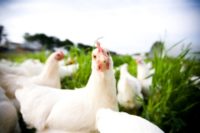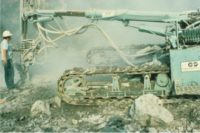Safety advocates object to rule speeding up slaughterhouse lines

A controversial rule issued by the U.S. Department of Agriculture (USDA) to increase line speeds and reduce government inspections at U.S. hog slaughterhouses will lead to increased workplace injuries and a greater risk of foodborne illness, says the National Council for Occupational Safety and Health (National COSH).
“Working in a slaughterhouse is a difficult, dangerous job,” said Jessica Martinez, co-executive director of National COSH. “Speeding up production lines will make these jobs even more difficult and more dangerous. Workers will be at a greater risk of getting sick, injured – or killed.”
The USDA inspector general, Martinez noted, is currently investigating whether the agency used flawed data and concealed information from the public during the rulemaking process. The investigation is expected to conclude at the end of 2019.
“There is no reason – other than the demands of industry – to rush forward with a new, potentially dangerous rollback of essential safety regulations.” said Martinez. “We don’t even know yet if this rule is based on solid scientific evidence. There is every reason to proceed deliberately when the health and well-being of so many workers and consumers is at stake.”
Meatpacking workers currently experience a higher rate of occupational illnesses than workers in any other industry, fifteen times higher than workers nationwide. Slaughterhouse workers also face risks of severe injury while using sharp cutting tools on rapidly moving production lines, including amputations, lacerations and repetitive stress injuries.
Currently, pork producers slaughter an average of 1,100 hogs per hour. The new USDA rule will remove any line speed limits from plants that are expected to account for more than 90 percent of the nation’s pork production.
The USDA proposal also poses increased hazards to consumers, reducing by 40 percent the number of federal inspectors in hog slaughterhouses. The new rule will allow processing firms such as Smithfield, Hormel, JBS Swift, and Clemens Foods to use their own employees to inspect for fecal matter and other contaminants on pork processing lines. A report from the USDA’s Office of Inspector General shows significant problems with food safety issues at pork processing plants that have piloted "self-inspection.”
Despite the line speed up authorized by USDA, Martinez said pork processing workers still have a right, under the U.S. Occupational Safety and Health Act, to a workplace free from preventable hazards.
About National COSH
National COSH links the efforts of local worker health and safety coalitions in communities across the United States, advocating for elimination of preventable hazards in the workplace. For more information, please visit coshnetwork.org.
Looking for a reprint of this article?
From high-res PDFs to custom plaques, order your copy today!







.jpg?t=1721257160)

